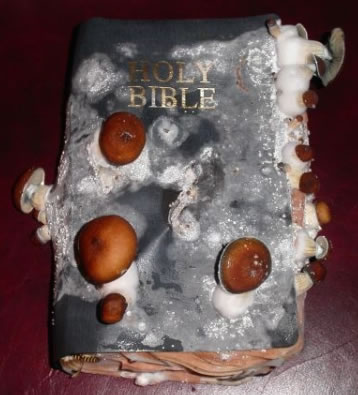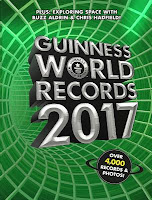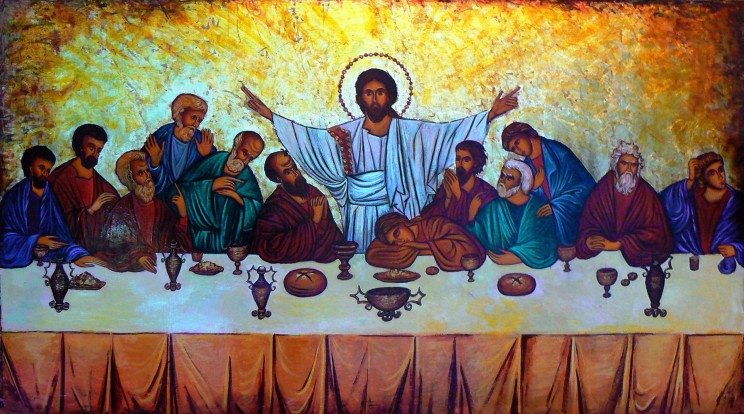new posts in all blogs
Viewing: Blog Posts Tagged with: The Bible, Most Recent at Top [Help]
Results 1 - 12 of 12
How to use this Page
You are viewing the most recent posts tagged with the words: The Bible in the JacketFlap blog reader. What is a tag? Think of a tag as a keyword or category label. Tags can both help you find posts on JacketFlap.com as well as provide an easy way for you to "remember" and classify posts for later recall. Try adding a tag yourself by clicking "Add a tag" below a post's header. Scroll down through the list of Recent Posts in the left column and click on a post title that sounds interesting. You can view all posts from a specific blog by clicking the Blog name in the right column, or you can click a 'More Posts from this Blog' link in any individual post.

By: Shelley Workinger,
on 12/23/2016
Blog:
But What Are They Eating?
(
Login to Add to MyJacketFlap)
JacketFlap tags:
Harry Potter,
J.K. Rowling,
Christmas,
Holiday,
Best,
American Girl,
Gift,
James Earl Jones,
The Bible,
Guinness World Records,
Goblet of Fire,
Shelley Workinger,
2016,
James Earl Jones Reads the Bible,
Add a tag
Happy Holidays, Hungry Readers!Instead of giving you the same-old best-seller list of gift suggestions, I thought I'd make this year's post a little more personal and share which books my family will be giving/receiving. Maybe you'll find one of them to be a good gift for someone you know as well. :)
The
Guinness World Records 2017 edition is for the boy child, but it always turns into a full-family gift as he reads aloud every. single. record. Mostly interesting for all, but beware this is not for the faint of heart; many of the bug and FOOD records can be quite disgusting!
The
American Girl Guide is for the girl child because, like any fictional character, even the dolls have extensive back-stories. More history = deeper understanding = more imaginative and intelligent play!
Harry Potter #4 is for my husband, the most-behindest reader of all time. ;) We have a family rule that we can't watch a film until we've read the book and he REALLY wants to catch up to the rest of us with the movies, so now he can use the vacation week to crack this spine!
As for me, I have asked for - and hopefully not delusionally expect to recieve -
The Bible as read by James Earl Jones. This tome of all tomes has been on my TBR list since really the beginning of days but its sheer size has kept it anchoring the bottom of the pile. But then,
Totes Magotes!, I find a version that will be read to me by the greatest narrator* of all time?! It's the only item on my Santa list and I have been VERY good this year...
Be sure and let me know the best reads you give and receive this holiday season;
Happy Holidays to All and to All a Good Read!

By: KatherineS,
on 9/23/2016
Blog:
OUPblog
(
Login to Add to MyJacketFlap)
JacketFlap tags:
Arts & Humanities,
Babylonia,
Babylonia: A Very Short Introduction,
Belshazzar’s Feast,
Bruegel,
Hammurabi,
Near Eastern world,
Tower of Babel,
Trevor Bryce,
History,
Iraq,
World,
Middle East,
VSI,
Very Short Introductions,
the bible,
rembrandt,
mesopotamia,
babylon,
*Featured,
saddam hussein,
Classics & Archaeology,
Nebuchadnezzar,
Add a tag
‘Babylon’ is a name which throughout the centuries has evoked an image of power and wealth and splendour – and decadence. Indeed, in the biblical Book of Revelation, Rome is damned as the ‘Whore of Babylon’ – and thus identified with a city whose image of lust and debauchery persisted and flourished long after the city itself had crumbled into dust. Powerful visual images in later ages, l perpetuate the negative image Babylon acquired in biblical tradition.
The post Nebuchadnezzar to Saddam Hussein: The history of the myth of Babylon appeared first on OUPblog.

By: AlyssaB,
on 1/16/2016
Blog:
OUPblog
(
Login to Add to MyJacketFlap)
JacketFlap tags:
science and religion,
*Featured,
Science & Medicine,
hebrew scriptures,
Book of Genesis,
Arts & Humanities,
Biblical studies,
scientific theories,
Can Science Explain Religion,
The Cognitive Science Debate,
James W. Jones,
primitive science,
sacred texts,
Books,
Religion,
biology,
Hebrew,
physics,
quantum mechanics,
the bible,
Add a tag
When I first heard the suggestion that religion is primitive science, I put it down to ignorance on the part of people who had not studied these things. Having not studied religion, they did not understand what our ancestors’ religious statements were really doing.
The post Religion is not primitive science appeared first on OUPblog.

By: AlyssaB,
on 1/4/2016
Blog:
OUPblog
(
Login to Add to MyJacketFlap)
JacketFlap tags:
Bathsheba,
repentance,
judaism,
old testament,
the bible,
Fasting,
Plutarch,
*Featured,
the new testament,
Arts & Humanities,
hebrew bible,
Biblical studies,
and the Interpretation of Scripture,
david lambert,
How Repentance Became Biblical,
philo,
platonism,
the penitential lens,
Books,
Religion,
christianity,
Add a tag
Many people assume that repentance is and always has been a substantial part of the Bible, but that was not always the case. In the following interview between Luke Drake, a Ph.D. candidate at the University of North Carolina at Chapel Hill, and David Lambert, an assistant professor of Religious Studies at the University of North Carolina at Chapel Hill and author of How Repentance Became Biblical: Judaism, Christianity, and the Interpretation of Scripture, the two discuss how repentance came to be seen as a part of the Bible and the early history of repentance as a concept.
The post Repentance and the Bible: A Q&A with David Lambert appeared first on OUPblog.

By: Catherine,
on 9/12/2015
Blog:
OUPblog
(
Login to Add to MyJacketFlap)
JacketFlap tags:
ovid,
the bible,
*Featured,
Geneva Bible,
Theatre & Dance,
Images & Slideshows,
Lucan,
Arts & Humanities,
Illuminating Shakespeare,
Shakespearean influences,
Arthur Brook,
Bishop’s Bible,
Giovanni Boccaccio,
Holinshed Chronicles,
Shakespeare's reading,
Books,
Literature,
shakespeare,
Add a tag
William Shakespeare was undoubtedly a literary mastermind, yet several allusions and quotations in his works suggest that he gathered ideas from other texts. Ovid's Metamorphoses, for example, was alluded to more than any other classical text, and the Bishop's and Geneva Bibles were quoted numerous times in his works. Shakespeare's reliance on source material from external literature was a common practice of the time period.
The post Shakespeare’s work: pure genius or imitatio? appeared first on OUPblog.
Tennessee joins Louisiana as a state that will not make The Bible its official book.
Despite approval from the the House State Government committee and the House Calendar and Rules Committee, a bill to make the good book the official book of Tennessee was killed by the State Senate this week. The Tennessean has the scoop:
Bolstered by opposition from Republican leadership, the Senate voted 22-9 to send the Bible to committee, effectively killing the bill a day after it was adopted by the House.
“This isn’t the time or place now in the full Senate floor to delve into that. We really need to look into it in committee,” Senate Majority Leader Mark Norris, R-Collierville, said about two hours before the vote.

By:
[email protected],
on 4/13/2015
Blog:
Perpetually Adolescent
(
Login to Add to MyJacketFlap)
JacketFlap tags:
literary fiction,
Exodus,
The Bible,
kazuo ishiguro,
Arthurian legend,
Book Reviews - Fiction,
Joy Lawn,
the buried giant,
The Childhood of Jesus,
These Are the Names,
Tommy Wieringa,
Book News,
Add a tag
My standout literary fiction of the year so far is Dutch author Tommy Wieringa’s These Are the Names (Scribe) and Kazuo Ishiguro’s The Buried Giant (Faber & Faber). Both these writers have been awarded for previous works and should have similar success with these books. The novels are masterfully written, with myth-like, nebulous settings and a […]
 People throughout human history have invented a great number of deities from Zeus to Odin to Allah. One creative has decided to put a new spin on the book of Genesis by replacing every reference to the name God with that of controversial hip hop star Kanye West.
People throughout human history have invented a great number of deities from Zeus to Odin to Allah. One creative has decided to put a new spin on the book of Genesis by replacing every reference to the name God with that of controversial hip hop star Kanye West.
The Etsy shop owner behind “the Book of Yeezus” calls his “novelty coffee-table book” a “Bible for the New Age.” Each unit sells for $20.00.
Here’s more about the item: “In a sense, Kanye’s awesome and orchestrated spectacle is truly a religious experience. In a foreword, we explore our consumerist, quick-fix, and information-culture, and celebrate Kanye and the outsized significance he plays in our lives. All of this, bound in a black, hard-cover gold-leaf imprinted book.” (via The Hollywood Reporter)
Tennessee politician Jerry Sexton is pushing to make The Holy Bible the official state book.
The Tennessean has the scoop: “It’s unclear how the proposal would meet a provision in Tennessee Constitution that states that ‘no preference shall ever be given, by law, to any religious establishment or mode of worship.'”
Tennessee is not the first state to consider The Bible as its state book. Last year, a Louisiana politician introduced a bill to make a specific copy of The Bible its official state book. The bill was withdrawn after a couple of weeks because apparently the bill became a “distraction.”

By: RachelM,
on 9/20/2014
Blog:
OUPblog
(
Login to Add to MyJacketFlap)
JacketFlap tags:
Books,
Religion,
jesus,
christ,
exegesis,
Eucharist,
the bible,
holy communion,
Humanities,
communion,
*Featured,
Cyril of Alexandria's Trinitarian Theology of Scripture,
Matthew R. Crawford,
Saint Cyril of Alexandria,
Add a tag
It is a well known fact that the Christian church has, in the course of its 2,000-year long history, often been torn with controversy over how to understand those four simple words, ‘This is my body.’
The Orthodox have never been entirely comfortable with the label ‘transubstantiation,’ and at the outset of the Reformation, the Catholic understanding of the Mass was one of the prime issues that provoked Luther to decry the ‘Babylonian captivity’ of the church.
Luther, of course, went on to denounce Zwingli’s view of the Eucharist as vehemently has he had the Catholic one, and slightly later the Reformed followers of Calvin decided that they disagreed with both Luther and Zwingli. The intensity of these debates is understandable in light of the fact that all involved assumed that a correct understanding of the Eucharist had a direct bearing upon the manner in which Jesus was present to his followers.
Was Jesus still here, bringing salvation to his church, or had he departed and left them to get by as well as they could on their own? Defining the nature of this ritual was intrinsically tied to understanding the purpose of this community. Although this story is one often told, the parallels it presents to Christian views on the Bible have often gone overlooked. For the sources of Christian communal identity for the past two millennia include not only a ritual meal but also a written book.
At first this assertion strikes the reader as so obvious it hardly merits mentioning. However, recognizing the importance of this principle accounts for some of the disconnect modern readers of the Bible experience when they attempt to read accounts of scriptural interpretation from late antiquity.
As recounted in Michael Legaspi’s The Death of Scripture and the Rise of Biblical Studies, in the past five hundred years the Bible in the West has undergone a transformation as it was abstracted from its previous home in a unified Christian church and resituated in the context of modern academia.
Such a move would have appeared quite foreign to Christians of an earlier age who assumed that the Bible could not be understood properly apart from grasping its place in the divine plan of salvation centered upon the person of Jesus Christ.
For example, Cyril of Alexandria, the fifth-century bishop of the city that served as the intellectual capital of the Roman world, liked to use a metaphor to explain the Bible’s purpose to his Christian hearers.
In his sermons and writings, he explained the presence of the Bible in the church by stating that Jesus had given this book to his followers, like a shepherd providing his flock with green grass for their nourishment.
Cyril, of course, knew that the Bible was written by countless persons over a vast span of time, and he tried, using the best tools available to him, to attend to that sort of historical detail. But what was most important, in his view, was the fact that when the Bible was read, Jesus himself was present to save, in a manner akin to his presence in the Eucharist.
Whether it was the words of Moses or of the evangelist Mark, when Christians sitting in the basilica in late antique Alexandria heard the scriptures, what they experienced was Jesus himself speaking to them through that myriad of human voices.
And in making this assumption they were following a trajectory already begun in the New Testament itself. Had not the Apostle Paul declared that Christ was speaking in him (2 Cor. 13.3), and did not Jesus himself say that his words were ‘Spirit and life’ (John 6.63)?
For most twentieth-century historians, early Christian exegesis was regarded as unworthy of historical attention due to its failure to attain the standards of modern hermeneutical method.
Imagine the absurd parallel of modern scientists rejecting medieval views on the Eucharist on the basis that those benighted premoderns did not properly understand the chemical composition of bread and wine. Such a dismissal hardly grapples seriously with the way Christians tried to articulate the function of the ritual.
Late antique readers fair somewhat better when seen in their own context. If the Bible is viewed as the written and living voice of Jesus, then the task of interpretation comes to mirror this assumption.
Just as Jesus speaks through the human authors of the Bible, so interpretation must be a process of finding Jesus in those same words, so as to provide spiritual nourishment for Christians seeking to grow in virtue and understanding.
In this way, what Cyril and his contemporaries believed about the Bible determined the way in which they read the Bible as a community, and the consistency of their approach is laudable.
The Bible is open to a great many interpretive approaches, and the plausibility of those methods will always be a product of the community in which the reader is situated. Late antique Christians, who assumed that scripture functioned analogously to the Eucharist, at least managed to find an interpretive method that accorded with their communal experience of this book.
The post ‘This is my word’: Jesus, the Eucharist, and the Bible appeared first on OUPblog.

Most book dealers state they take books in “good” condition. Some customers have an interesting definition of “good.” Many of these arguments on “why won’t you buy this hideous book?” end up with the customer arguing “but its a good book!” and telling you all about the wonderful story and how it moved them. This is all well and good, but when the book is missing both covers and smells of cat pee, you generally don’t want it, no matter what the contents are like. If it’s a truly rare manuscript entirely valuable for its writing, then perhaps you can learn to love the smell of urine… but it never is. How hard the person argues “but it’s a good book!” is inversely proportional to how valuable it is. The person with the coverless Danielle Steel that you can smell from six feet away is the one that wants to argue about value.
Sometimes you wonder how they missed just how awful it was. If they’ve clearly tossed all the loose books in a box and you find one the dog ate, that is understandable. Or one in the box has a warped cover from coffee. Everybody misses one or two. It’s the ones that bring you an entire box that appears to have had a nest of incontinent weasels in it that you wonder about. Why are they bringing it to you? Do they really think you’ll buy it?
The boxes that smell clearly of mildew are the most perplexing. I’m not super sensitive to mildew, but have had customers come in with boxes that made my eyes water and nose clog from six feet away. How the heck did they pick it up and carry it around without noticing? How did they drive over in a car without dying of respiratory failure?
But really, this is all a lead up to showing you a picture of an awful book. I’m unsure of the original source, it’s just been all over the internet recently. No explanation of where it was found. I have nightmares that this book will arrive at the store. “But it’s a good book! It’s The Good Book!”

Bible growing mushrooms
NO, I DON’T CARE HOW “GOOD” IT IS, IT’S GROWING MUSHROOMS!!!
I have personally had people bring in books covered in visible layers of mold “fur”, but never actual mushrooms. But I’m sure a mushroom covered book will show up one day…

In my new Time Sniffers series, I'm creating a reality where there are millions of inhabited worlds in the galaxy. I spun off of C. S Lewis's "Out of the Silent Planet," with the idea the Earth, when originally exposed to the evil influence of dark energy infiltrating the galaxy (it makes up 74 percent of what's "out there," but no one knows what it is), quickly fell to evil's power. I then wondered--since humans did fall fast and hard in the Garden and have suffered a type of spiritual blindness, wandering lost ever since--what if there were other worlds that had also been unable to resist evil? I imagined them as "shadow worlds," whereas many other worlds, more resilient to evil and not in shadow, would exist with truth and clarity as commonplace.
I love the movie K-Pax. If you haven't seen it at least five times, you are really missing something. It is the consummate story of freedom from fear in all its aspects. Prot, from K-Pax, is truly messianic in the way he leads others to healing--not by a miraculous touch, though, but by showing each one their fear and the reality that they don't need to be afraid. Howie, Ernie, Bess--all the characters on the nut ward--are terrified of something--of dying, of dirt, of smells, of being touched. And Prot gets them to understand why they are afraid and why they don't need to be. The healing and wholeness follows.
In one place, Prot is explaining to the psychiatrist, Dr. Mark Powell, about his world and how they don't need jails and punishment, or laws to regulate behavior. Powell asks, "well then, how does one know what is right and wrong on K-Pax?" Prot gives an astute answer: "Every being in the universe knows what's right and wrong, Dr. Powell." Powell: "What? No crime, brutality, no violence on K-Pax?" Prot answers, "You humans. sometimes it's hard to imagine how you've made it this far."
What if other shadow worlds existed, like ours, in ignorance, denial of truth, and fear? And what if millions of other worlds did not fall into shadow, but remained in "the light" of truth, resisting temptation and remaining true to God? Then you would have two types of worlds out there.
I tie in the fear element because Paul wrote how humans are in bondage to fear, that because of the Devil, we have been enslaved to fear of death. That only the truth through Jesus sets us free, as he stated, "If the Son sets you free, you are truly free." Freedom is more than the right to express yourself and live without tyranny. The fear here spoken of goes way deeper--to our very hearts. For once we understand we have been set free from death, since Christ was victorious over death, we do not have to live in bondage to fear, for we have an undefiled, imperishable, and unfading inheritance waiting for us, regardless of what happens to us in this life. Maybe a person wouldn't risk running out in front of a car to save someone, fearful they would die. But if they knew of their eternal inheritance awaiting them, wouldn't that change their point of view? Perhaps they'd be willing to risk death to save another. And we have Jesus' own example of giving his life so we might live. The Bible says perhaps someone might dare to die for a good person, but God recommends his own love for us in that, while we were yet sinners, Christ died for us.
These may seem like disparate musings, but my brain stirs up all kinds of ideas when I'm writing a book. I've always tended to think that we humans just might be the only creatures in existence that don't really know right from wrong, as Prot claims. We see the result of six thousand years of humans determining right from wrong. We live in shadow. As Paul also wrote, we see through a glass darkly, in part, obscured. We, on this shadow world, need light, and that light came in the form of a messenger sent by God. No, not Prot, but Jesus. And his healing is not just spiritual and emotional, but total and everlasting.
I do know that dark energy is not responsible for all the evil in the universe, but it, to me, symbolizes the pervasive aura of evil generated by the original act of disobedience that spread sin to all mankind. It is like a dark energy, and it does influence us tremendously. So I use it as a metaphor, and when the rip in time blows open, the deleterious effects of that energy wreak havoc on the shadow worlds already entrenched in evil. Just a fun, adventure series for young adults! You can read the first few chapters back on my Web site under "fantasy."











Hey Girl!
Nice to see you here :) Great post!!!! I love C.S.Lewis!
Diana Joy